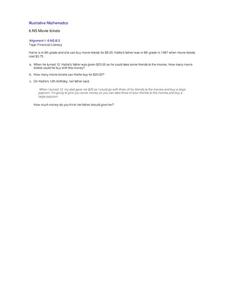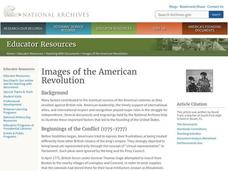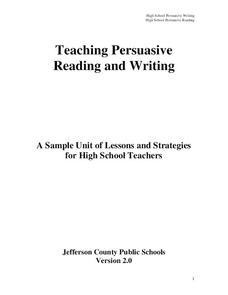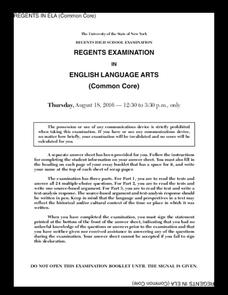Illustrative Mathematics
Kimi and Jordan
A single activity gets your math class to solve a word problem using two linear equations and two variables. They compare the summer earnings of Kimi and Jordan and then graph the solutions to determine who will save the most money in a...
Illustrative Mathematics
Movie tickets
This is a good Common Core question that relates inflation to operations with decimals and rounding. Young learners are asked to find out if an amount of money can purchase the same amount of movie tickets in 2012 as it did in 1987. They...
Illustrative Mathematics
Peaches and Plums
According to the resource graph, which costs more: peaches or plums? Algebra learners compare two proportional relationships and then throw in a banana. Leaving out the scale helps students become intuitive about graphing.
Howard Hughes Medical Institute
Winogradsky Columns: Microbial Ecology in the Classroom
Winogradsky columns are ideal for observing the role of bacteria and other microorganisms in an ecosystem. This student activity guide is complete with data tables for observations and analysis questions for processing what was observed....
Polk Bros Foundation
Comprehensive Nonfiction Reading Questions
Analyze any nonfiction text with the set of questions on this sheet. Class members practice inferring by noting the main idea and purpose of a passage. They also analyze an opinion in the passage and write a brief summary. See the...
Florida Center for Reading Research
Vocabulary: Morphemic Elements, Root-O!
Young readers get to the root of unfamiliar vocabulary with a collaborative learning activity. Given a deck of root word cards and copies of a graphic organizer, pairs of students take turns flipping over cards and brainstorming...
Florida Center for Reading Research
Vocabulary: Words in Context, Ask-Explain-List
Engage young readers in using context clues with this collaborative vocabulary activity. In pairs, children draw from a deck of cards, with each card asking a question about a context involving a specific vocabulary word. After...
Federal Reserve Bank
Savvy Savers
What are the benefits and risks of saving in an interest-bearing account? Pupils explore concepts like risk-reward relationship and the rule of 72, as well as practice calculating compound interest, developing important personal...
K12 Reader
The Important Apostrophe: Their, They’re, and There
They're going to be there with their family. Class members practice using and identifying the correct use of they're, there, and their with a skills practice instructional activity. The top half of the instructional activity gives brief...
K12 Reader
The Important Apostrophe: You're and Your
You're going to love a worksheet that teaches your class the difference between you're and your. Learners read a brief introduction explaining the two words and practice identifying the correct uses. Then, they read sentences...
Jefferson County Schools
Teaching Persuasive Reading and Writing
With the increasing emphasis on persuasive and argumentative writing, the lessons and strategies in the sample unit are sure to prove valuable—whether you are new to or an experienced pro at teaching persuasive reading and writing.
Mathematics Assessment Project
Square
Don't be a square! Young mathematicians determine the slope and length of a line segment. They then prove whether four given coordinate points form a square.
Illustrative Mathematics
Modeling London's Population
Looking at London's population from 1801–1961 in 20 year increments, high school mathematicians determine if the data can be modeled by a given logistic growth equation. They explain their thinking and determine the values of each...
Chicago Botanic Garden
Historical Climate Cycles
Scientists use ice core samples to obtain temperatures of the earth from 400,000 years ago! The third of five lessons instructs pupils to interpret historical climate data to see changes over time. In part I, participants interpret...
K5 Learning
Will the Wolf
How well can a wolf survive without a pack? Third graders read about headstrong Will and his desire to be an independent wolf with a short story and series of comprehension questions.
Illustrative Mathematics
Counting Stamps
Stamps come in sheets, strips, and singles. Young mathematicians use their knowledge of hundreds, tens, and ones to determine how many stamps Mike has altogether.
Daughters of the American Revolution
Lesson 1: How Do Society’s Expectations Influence Education?
The history of women's education can be traced back to the delicate stitching of student samplers from the 19th century. Modern-day pupils examine and analyze four primary sources, three of which are images of embroidered samplers, which...
Smithsonian Institution
Water/Ways: The Poetry of Science
Water is the source of life. It appears in poetry in both peaceful and torrential descriptions; it appears in earth science in its liquid, gaseous, and solid states. Combine these interpretations of our planet's most precious and...
New York State Education Department
Comprehensive English Examination: June 2014
Learners take their first step toward mastering test-taking by answering questions based on listening and reading comprehension. In addition to multiple choice questions, the examination includes two short-answer items and one essay.
New York State Education Department
Comprehensive English Examination: January 2014
What better way to prepare learners for academic success than to administer practice tests? With the Comprehensive Examination in English, scholars read informational and literary texts and answer listening and reading comprehension...
New York State Education Department
English Language Arts Examination: January 2017
After reading literary and informational texts, scholars answer multiple-choice questions and write both a source-based argument and a text-analysis response.
New York State Education Department
English Language Arts Examination: January 2016
An English Language Arts exam contains 24 multiple-choice questions that individuals answer after reading informational and literary passages. Scholars then write a source-based argument and text-analysis response.
New York State Education Department
English Language Arts Examination: August 2016
If it's true that preparation is the key to success, the English Language Arts Examination handout should help pupils ace their exams. Scholars read several texts and answer multiple-choice questions. Then, they write source-based...
New York State Education Department
English Language Arts Examination: June 2016
The English Language Arts Examination handout contains a variety of multiple-choice questions to assess reading comprehension, in addition to a source-based argument essay and text-analysis response prompts.
Other popular searches
- Common Core Standards
- Common Core State Standards
- Math Common Core Standards
- Science/common Core Standards























